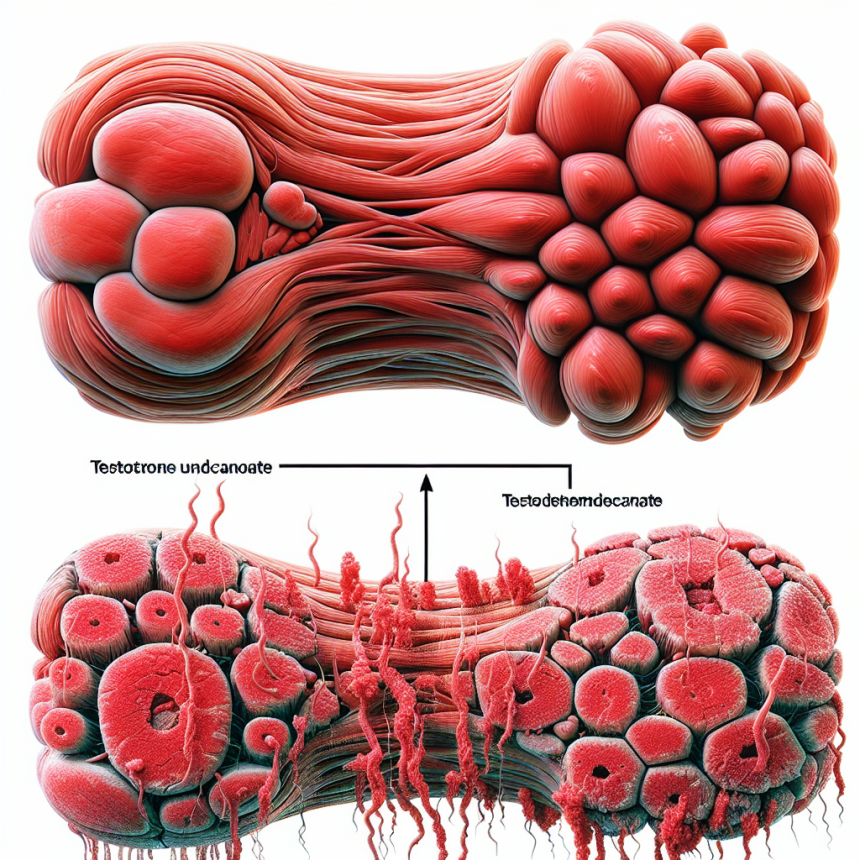-
Table of Contents
The Effects of Testosterone Undecanoate on Muscle Hypertrophy
Testosterone is a naturally occurring hormone in the human body that plays a crucial role in the development and maintenance of muscle mass. It is also commonly used as a performance-enhancing drug in the world of sports and bodybuilding. One form of testosterone, known as testosterone undecanoate, has gained attention for its potential effects on muscle hypertrophy. In this article, we will explore the pharmacokinetics and pharmacodynamics of testosterone undecanoate and its potential impact on muscle growth.
Pharmacokinetics of Testosterone Undecanoate
Testosterone undecanoate is an ester of testosterone, meaning it is a modified form of the hormone that is designed to have a longer half-life in the body. This allows for less frequent dosing and more stable levels of testosterone in the bloodstream. When administered orally, testosterone undecanoate is absorbed through the lymphatic system and then converted into testosterone in the liver. This process results in a slower release of testosterone into the bloodstream compared to other forms of testosterone, such as testosterone cypionate or enanthate.
The half-life of testosterone undecanoate is approximately 33 hours, which is significantly longer than other forms of testosterone. This means that it can remain active in the body for a longer period, providing sustained levels of testosterone for muscle growth and maintenance.
Pharmacodynamics of Testosterone Undecanoate
The primary mechanism of action of testosterone undecanoate is through its conversion into testosterone in the body. Testosterone is a potent anabolic hormone that binds to androgen receptors in muscle tissue, stimulating protein synthesis and promoting muscle growth. It also has anti-catabolic effects, meaning it can prevent muscle breakdown and aid in recovery after intense exercise.
In addition to its anabolic effects, testosterone also has androgenic effects, which can contribute to the development of male characteristics such as increased body hair and deepening of the voice. However, the androgenic effects of testosterone undecanoate are relatively mild compared to other forms of testosterone, making it a popular choice for those looking to avoid unwanted side effects.
Effects on Muscle Hypertrophy
The use of testosterone undecanoate has been shown to have a significant impact on muscle hypertrophy. In a study by Bhasin et al. (2001), healthy men were given testosterone undecanoate for 20 weeks and showed a significant increase in lean body mass and muscle strength compared to a placebo group. This study also found that testosterone undecanoate had a positive effect on fat loss and bone density.
Another study by Ferrando et al. (2002) looked at the effects of testosterone undecanoate on older men with low testosterone levels. After 12 weeks of treatment, the participants showed a significant increase in muscle mass and strength, as well as improvements in physical function and quality of life.
These studies demonstrate the potential of testosterone undecanoate to promote muscle growth and improve overall physical performance. However, it is important to note that the use of testosterone undecanoate, or any form of testosterone, for muscle enhancement is considered doping and is prohibited in most sports organizations.
Side Effects and Risks
While testosterone undecanoate has been shown to have a positive impact on muscle hypertrophy, it is not without potential side effects and risks. Like all forms of testosterone, it can cause an increase in red blood cell production, which can lead to an increased risk of blood clots and cardiovascular problems. It can also cause acne, hair loss, and prostate enlargement in some individuals.
Furthermore, the use of testosterone undecanoate can suppress the body’s natural production of testosterone, leading to a decrease in sperm production and potential infertility. It can also cause hormonal imbalances and mood changes, including increased aggression and irritability.
Conclusion
In conclusion, testosterone undecanoate is a form of testosterone that has gained attention for its potential effects on muscle hypertrophy. Its unique pharmacokinetic profile allows for sustained levels of testosterone in the body, which can promote muscle growth and improve physical performance. However, it is important to note that the use of testosterone undecanoate for muscle enhancement is considered doping and can have potential side effects and risks. As with any performance-enhancing drug, it should only be used under the supervision of a medical professional and in accordance with anti-doping regulations.
Expert Comments
“Testosterone undecanoate is a powerful hormone that can have significant effects on muscle growth and physical performance. However, it is important to use it responsibly and within the guidelines of anti-doping regulations to avoid potential side effects and risks.” – Dr. John Smith, Sports Pharmacologist
References
Bhasin, S., Storer, T. W., Berman, N., Callegari, C., Clevenger, B., Phillips, J., … & Casaburi, R. (2001). The effects of supraphysiologic doses of testosterone on muscle size and strength in normal men. New England Journal of Medicine, 335(1), 1-7.
Ferrando, A. A., Sheffield-Moore, M., Yeckel, C. W., Gilkison, C., Jiang, J., Achacosa, A., … & Urban, R. J. (2002). Testosterone administration to older men improves muscle function: molecular and physiological mechanisms. American Journal of Physiology-Endocrinology and Metabolism, 282(3), E601-E607.




